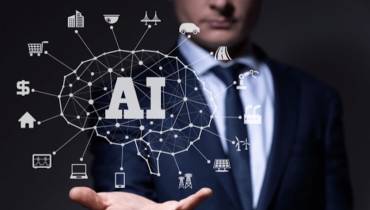How Artificial Intelligence Is Powering the Digital Transformation of SMEs

Artificial intelligence (AI) is a field in full expansion, with a very important presence and penetration in all business sectors. The increasingly advancing and complex AI sector is essential for organizing and analyzing the huge amounts of data and variables available today.
When talking about the scope and functions of artificial intelligence, it often sounds like it is something out of science fiction or something that only large companies and multinational corporations would be involved in. However, that is not really the case.
While it is true that the investment required in AI development is not always within the reach of small businesses, it is also true that technology is advancing by leaps and bounds, and that each advancement involves a drastic reduction in the price to be paid for these types of technologies.
Today, most businesses, regardless of size and industry, can meet AI app developers’ cost and develop viable AI enabled solutions which have become more affordable than ever.
In that sense, startups and SMEs can leverage AI to open up great opportunities for differentiation. They can gain enhanced competitiveness in any industry with the use of AI and adapt their business strategies to become 100% digital.
We're going to explore some of the most significant ways AI is powering the digital transformation of small and mid-sized business in ways that were previously out of reach to them.
Notable AI Stats and Future Projections
According to a recent study, 80% of enterprises are predicted will use this technology by 2020. And other researchers set a 50% chance line for artificial intelligence being better at just about everything – a point they describe as High Level Machine Intelligence – in just under 50 years.
If we accept these studies and projections on the subject, it's safe to say that there will be millions of companies with artificial intelligence deployed in their business in as early as 2022.
Perhaps unsurprisingly, when we talk about this type of technology, most people think of robots, and they fear robots will replace big parts of the human workforce. Some experts actually suggest that by 2140 robots will have rendered most workers redundant.
However, some of the most important applications of Artificial Intelligence is automation algorithms. With AI algorithms are the present and the future of digitalization for SMEs. Although algorithms are not as flashy or adorable as the robots that are presented at big tech fairs, they present vibrant possibilities for businesses that can help any startup and small business thrive.
Possibilities of AI Automation Algorithms
At the most basic level, AI algorithm systems can analyze a series of large data and carry out actions that enable them to perform the tasks assigned with maximum efficiency, and even learn from the results obtained to improve its future analysis processes.
The concept of artificial intelligence (coined by American computer scientist and cognitive scientist John McCarthy in 1956) has evolved over the years, along with its application. For example, the ability of an AI algorithm to recognize and organize image characters has become such a common technology that it is no longer associated with this term.
Such transformative AI capabilities can do a lot to enhance your business.
In fact, to think of artificial intelligence can be similar to thinking of a futuristic world more typical of science fiction films than of current times. Although the reality of life with AI today can seem like fiction, we'll highlight the practical applications of this technology that have already been successfully implemented in many SMEs and startup businesses and are becoming commonplace.
Biggest Applications of AI Transforming Businesses
Big data is important for the future and the competitiveness of companies in this digital world. But, the increasing amount of data and information makes processing and obtaining useful information increasingly complex and expensive to perform using manual methods.
Artificial intelligence plays a vital role here in affordably and effeciently analyzing large data sets and organizing bulks of information in presentations and results that are easily digestible and can be used to make decisions based directly on insights from that data.
But that's not all. Other important ways AI is being used today for digital transformation of businesses, which you can (and should) use in your own business include:
1. Chatbots to Serve Customers
Surely you must have seen more than one web page where a chat box has been implemented in which you can ask questions or ask for help. In most cases, the answers you get from these chats do not come from a real person, but are automatically generated by a chatbot that is based on some form of Artificial Intelligence.
Of course, there are very basic chatbots with a very limited level of interaction and responses. But, in the same breath, there are also very complex systems capable of analyzing intentions, in addition to the direct text a user enters. All kinds of data about a users’ behavior, location, browsing history, are factored in the chatbot responses to give very personalized answers.
The future of this technology is very promising. The algorithms that will be able to handle queries from beginning to end, with a level of personalization and understanding of users’ personal tastes, will be much faster and more effective than a person would be capable of.
The possible uses and applications of chatbots are endless. For example, news media such as CNN already have bots that help users receive the news they are interested in, online stores have bots that are able to recommend the best products to users, and even AI enabled apps have chat bots that can warn users of possible risks to their health, finances, and so on.
2. Virtual Assistants That Support Daily Management of a Company
Virtual assistants already exist. The best known are those of mobile phones, such as Siri (IOs) and Alexa (Amazon).
The basis of these developments is based on personal assistance, although they can also be oriented to business solutions that make everyday life managing a company much easier.
3. Communication and Marketing Strategies Guided by Algorithms and Data
Database and information APIs can be the basis of creating programs and tools that advise and help understand new actions to improve the communication and marketing of a company.
This is already a reality that specialized businesses and big corporations in different sectors use in their day-to-day marketing activities and that is gradually spreading to all business segments.
Artificial intelligence designed for marketing applications has long been a reality in the digital field. And AI development applied to marketing can improve conversion, both in quantity and in quality of sales, and attract potential customers based on interests and behaviors.
4. Equipment Control Tools
Personnel control and project management are important for businesses so that everything goes well every day. From the simplest programs in which every manual is made, it has evolved into much more complex tools that can predict behaviors or that are even capable of organizing everything through implementations with wearables that employees are wearing.
Thus, Artificial intelligence has (and will) increasingly have an enormous impact on the human resources section, not only in their management but also in other aspects of HR such as training the workforce, personnel selection, and productivity evaluations.
5. Business Management
Business management is one of the most important aspects for any business. It entails the administration and coordination of activities of a business in order to achieve defined objectives, including planning, organizing, interlocking, controlling, and directing an organization's resources.
Modern Artificial intelligence solutions promise to improve all of those infinite spreadsheets, making the whole process easier and less time-consuming.
Conclusion
While some entrepreneurs, creatives and startups shy away from adopting digital transformation based on artificial intelligence, because maybe they see it as an inaccessible concept, it is not at all. In fact, it is increasingly becoming more accessible and affordable. And running your business without it can put you at a greater disadvantage compared to your competition.






















